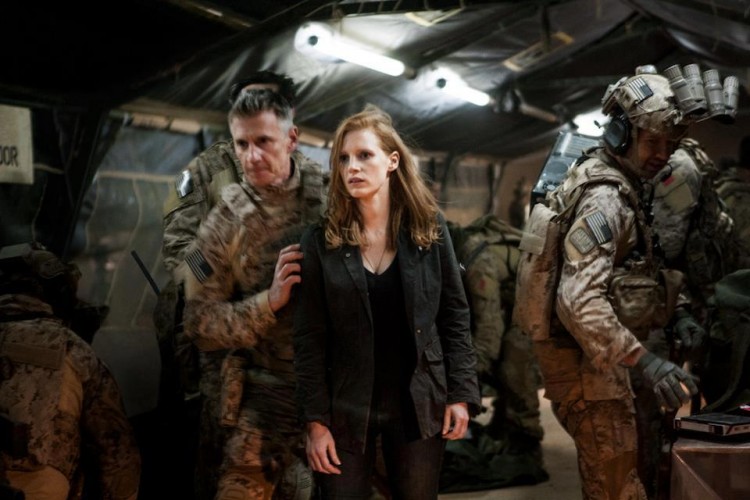From the moment “Zero Dark Thirty” opens to a black screen with the text “September 11, 2001” and the audio of a 9-1-1 call made that same day to its quietly emotional ending, Kathryn Bigelow’s Oscar-nominated film is impossible to look away from. Captivating and masterful, “Zero Dark Thirty” is the most worthwhile movie of the year.
The film spans the ten-year manhunt for al-Qaeda leader Osama bin Laden. The script, a combination of fact and drama written by journalist and Academy Award winning screenwriter (“The Hurt Locker”) Mark Boal, is described at the beginning of the film as based on first-hand accounts of actual events. However, the exact factual weight of the script and how these facts were accessed has been subject of controversy. The script bothers neither with character backstory nor a romantic subplot––or any subplot at all. From beginning to end, it is 100 percent focused on the central story, undeniably the right decision.
Though the characters are not actively the central focus, the acting is superb. Jessica Chastain’s steely, detached, and borderline unemotional portrayal of Maya, the woman whose eight-year obsession with the single job of catching bin Laden, is beautiful in its complexity.
The heartbeat of the film, however, lies in its directing. Every shot is well thought out, every cutaway has clear intent, every newsreel clip is well placed. Kathryn Bigelow’s biggest accomplishment is creating an intellectual film that does not dictate what her audience should think. There is never a concrete right or a wrong presented; the situations occurring are morally complex, and Bigelow leaves the audience to form opinions on their own.
As a film, “Zero Dark Thirty” is stunning, but things become more difficult when attempting to put it in a political, historical, or moral context.
On one hand, the film certainly isn’t the pro-Obama propaganda some initially feared it to be. In fact, President Obama barely has role in the story at all. It is not pro-Obama or anti-Obama. Nor is the film particularly patriotic––the film shows no partisan bias or agenda. The question it is facing now, a question being raised by numerous government officials including 2008 Presidential candidate, Senator John McCain, is whether or not it is pro-torture.
The graphic torture scenes in the film are painful and extremely hard to watch, especially because they are drawn out and uncomfortable. Men are beaten, dehumanized, and waterboard. At one powerful point in the film, CIA agents watch President Obama’s 2008 60 Minutes interview in which he stated that America does not torture. The agents show no reaction, but their methods continue on. The torture is never glorified and glamorized, but it is portrayed as a means to an end, which is where most issue is being taken. In fact, torture is even suggested as an unreliable way to extract information, shown in the film’s second torture scene where the victim ends babbling and screaming that he knows of no planned attack, only to have the following scene an attack on Saudi Arabia.
In the film, information vital to bin Laden’s capture was discovered via the method of torture, but there is no triumphant musical score, embracing hugs or saluting to the CIA after bin Laden is captured. The end of the film makes clear that the filmmakers acknowledge the cost of his capture and are not trying to justify it. The torture was a critical part of the film––it would have been hallow had they not portrayed it, and it, depending on the source, was a critical part that led to this portion in history.
A tour de force, perhaps the film is best summed up by a series of moments during the raid: the juxtaposition between the horrible violence committed on three families for one man and the shots of the US Navy SEALs quietly conflicted reactions to it. “Zero Dark Thirty” is never black and white; it artfully portrays the suffering, deaths, and questionable moral stature that achieved bin Laden’s historic death.






































![Teacher Lore: Mr. Hillman [Podcast]](https://bsmknighterrant.org/wp-content/uploads/2025/03/teacherlorelogo-1200x685.png)





Tom Backen • Jan 15, 2013 at 4:38 pm
Congrats on an astute, insightful, and well-written review. You clearly appreciated Kathryn Bigelow’s amazing direction and grasped the moral complexity of the film. Well-done!